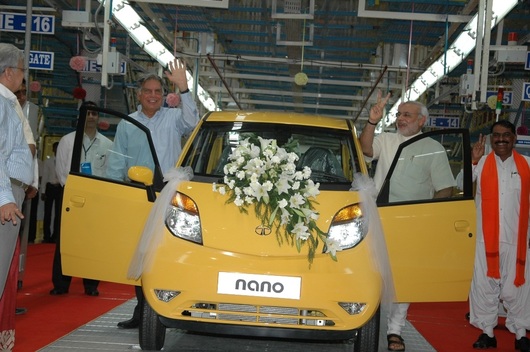|
Come 2014, Sanand, a small town around 40 kms from Ahmedabad, will be a name to reckon with in the country’s automotive sector. Following the re-entry of French car maker PSA Peugeot Citroen, the erstwhile sleepy town — already home to Tata Motors’ manufacturing plant for small car Nano — finds itself along the country’s prominent auto hubs like Pune in Maharashtra and Sriperumbudur in Tamil Nadu. In July, US-based Ford Motors had signed a deal with the state government for setting up a car manufacturing plant in the same town. “By 2014, Sanand will be a big auto hub in the range of Chennai and Pune. The Gujarat government had been focussing on Sanand to develop it as an auto-engineering hub because of its proximity of Ahmedabad,” said B B Swain, vice-chairman and managing director, Gujarat Industrial Development Corporation, which has allotted land to Ford and Tata Motors. Car makers have shown preference to Gujarat over other states due to its geographical advantage and infrastructure. By 2014, Sanand is likely to have an installed capacity of 655,000 cars annually after the two plants become functional.
Of these, Peugeot, of a total planned capacity of 340,000 units in phases, is aiming for an initial installed capacity of 165,000 cars a year by 2014. Ford India will also commission its car manufacturing facility by 2014 with a capacity of 240,000 units annually. According to the projections by car makers, Gujarat would have a manufacturing capacity of 765,000 cars per annum by 2014. This includes the existing capacities of Tata Motors’ Nano plant with 250,000 cars per annum and General Motors’ plant in Halol with 110,000 cars annually. Philippe Varin, chairman of the managing board, PSA Peugeot Citroën, attributes three reasons for choosing Sanand for its plant. “Availability of greenfield land and ready infrastructure are a couple of reasons for us to choose Sanand for the plant. Moreover, it is the enterprising nature of Gujarat that attracted us to the state.” In addition, with General Motors expanding existing capacity at its plant in Halol, Gujarat would be put onto the auto map of India with a total installed capacity of 765,000 cars per annum by 2014. This assumes importance when Tamil Nadu’s annual installed capacity is pegged at 1.28 million cars, while that of Maharashtra (most of which are in Pune) stands at 610,000 units. “Gujarat has a proactive administration. With respect to the auto industry, Gujarat also enjoys a huge supplier base which makes it one of the emerging auto hubs in India after Chennai, Talegaon and Chakan in Pune. After north India, western India has the second-largest supplier base with respect to the auto industry,” said P Balendran, vice-president, General Motors India. What’s more, going forward, if Maruti follows the foot-steps of global auto giants, then days are not far that Gujarat would command car manufacturing industry in the country with a staggering installed capacities of close to over 1.7 million cars per annum. This would pip Tamil Nadu (TN)’s numero-uno status for car manufacturing in India and put Gujarat in the distinct club of top 10 centres in the world for car manufacturing. Meanwhile, as per the figures provided by Society of Indian Automobile Manufacturers (SIAM), India’s total passenger vehicle production stood at 2,987,296 units for for 2010-11. |
Ankit
|





 RSS Feed
RSS Feed
